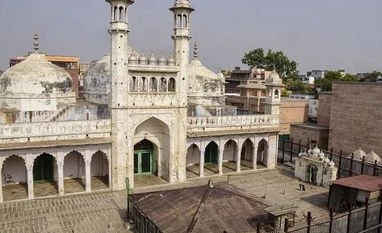Gyanvapi case: Allahabad HC rejects Muslim side's maintainability plea
The Allahabad High Court dismissed petitions of Sunni Central Waqf Board and Anjuman Intezamia Masjid Committee, and allowed suits seeking restoration of temple at Gyanvapi
)
Photo: PTI
Listen to This Article
The Allahabad High Court dismissed all petitions challenging the maintainability of a civil suit pending before a Varanasi court seeking the restoration of a temple at the site where the Gyanvapi mosque exists. The court ruled that civil suits filed by the Hindu worshippers and deity inter alia seeking restoration of a temple at the Mosque premises are not barred by the Places of Worship Act.
The Allahabad High Court stated that the Gyanvapi compound "can have either a Muslim character or a Hindu character", and it cannot be decided at the stage of framing issues.
The court stated: "The suit affects two major communities of the country... We direct the trial court to expeditiously decide the suit in six months."
The court further stated the Archaeological Survey of India (ASI) survey conducted in one suit shall also be filed in the other suits. "If the lower court feels that a survey of any part is necessary, the court may direct the ASI to conduct the survey," observed the Allahabad High Court.
The petitions filed by the Anjuman Intezamia Masjid Committee (AIMC) and the Uttar Pradesh Sunni Central Waqf Board contest a Varanasi court's April 8, 2021 order to conduct a comprehensive survey of the Gyanvapi mosque.
On December 8, Justice Rohit Ranjan Agarwal reserved judgment after listening to arguments from the petitioners' and respondent's counsels. The AIMC, which manages the Gyanvapi mosque near the Kashi Vishwanath temple in Varanasi, questioned the validity of a lawsuit brought before a Varanasi court. In the lawsuit, Hindu petitioners seek the restoration of a temple at the current site of the Gyanvapi mosque.
According to the Hindu side plaintiff, the Gyanvapi mosque is a part of the temple. However, the primary contention of the AIMC and the UP Sunni Central Waqf Board is that the suit is prohibited by the Places of Worship Act (Special Provisions) Act of 1991, which restricts altering the character of religious places as it existed on August 15, 1947.
More From This Section
Don't miss the most important news and views of the day. Get them on our Telegram channel
First Published: Dec 19 2023 | 11:37 AM IST
